How the world reported Alexei Navalny’s arrest
Poisoned Russian opposition leader detained after returning home from Berlin
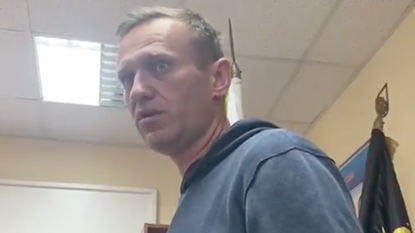
A Russian judge has begun a hastily assembled hearing into the detention of Alexei Navalny after the opposition leader was detained at Moscow’s main airport yesterday.
In a video posted on Twitter, Navalny said the judge was presiding over the case at a makeshift court in a police station. Addressing the camera, he says: “It’s impossible, what’s happening here. It’s the highest level of lawlessness, there’s no other word for it.”
The outspoken Kremlin critic was detained by police who were waiting when his flight landed at Sheremetyevo airport. Navalny was returning from Germany after spending five months in hospital in Berlin recovering from an assassination attempt blamed on the Kremlin.
Subscribe to The Week
Escape your echo chamber. Get the facts behind the news, plus analysis from multiple perspectives.

Sign up for The Week's Free Newsletters
From our morning news briefing to a weekly Good News Newsletter, get the best of The Week delivered directly to your inbox.
From our morning news briefing to a weekly Good News Newsletter, get the best of The Week delivered directly to your inbox.
The plane had been rerouted shortly before landing from Vnukovo airport, on the other side of the Russian capital, where photos posted online showed thousands of Navalny supporters had gathered.
The furore surrounding his return to Russia confirms Navalny as the Kremlin’s “greatest domestic enemy”, writes the Financial Times’ Europe editor Ben Hall. And his “treatment by the Russian government has only elevated his status as a symbol of repression”.
All the same, fears are mounting about Navalny’s safety. The Guardian’s Moscow correspondent Andrew Roth says that “what happens to Vladimir Putin’s opponent after his arrest depends on what officials think they can get away with”.
The Kremlin has “done its utmost to smother him” for more than a decade and could now seek to “sideline Navalny for good”, Roth continues.
Sign up for Today's Best Articles in your inbox
A free daily email with the biggest news stories of the day – and the best features from TheWeek.com
The arrest has drawn condemnation from leaders across Europe and in the US.
UK Foreign Secretary Dominic Raab has called for the opposition leader’s release, adding: “It is appalling that Alexei Navalny, the victim of a despicable crime, has been detained by Russian authorities.”
In his home country, Navalny has “won a young fan base through viral videos exposing corruption among the elites”, says independent newspaper The Moscow Times.
But “the question now is whether Navalny will be jailed for only a few days or weeks - as has happened to him repeatedly in recent years - or for much longer”, The New York Times adds.
Whether Putin’s plan is “to keep him busy fighting off new charges, detentions and harassment or send him to jail now largely depends on potential public backlash against his prosecution”, says The Telegraph’s Russia correspondent Nataliya Vasilyeva.
The international response is also likely to be a factor - and not everyone is calling for Navalny to be freed.
The state-owned China Daily devoted just 150 words to his arrest. Meanwhile, Budapest-based investigative journalist Szabolcs Panyi has tweeted about the “deafening silence” from the authorities in Hungary, where Prime Minister Viktor Orban has boasted of his “special relationship” with Putin.
Navalny’s supporters in Russia may draw hope from the circumstances surrounding his arrest, however.
The sudden diversion of his flight from an airport full of supporters “shows how scared the Kremlin is of any public show in his support”, The Telegraph’s Vasilyeva argues.
Create an account with the same email registered to your subscription to unlock access.
Joe Evans is the world news editor at TheWeek.co.uk. He joined the team in 2019 and held roles including deputy news editor and acting news editor before moving into his current position in early 2021. He is a regular panellist on The Week Unwrapped podcast, discussing politics and foreign affairs.
Before joining The Week, he worked as a freelance journalist covering the UK and Ireland for German newspapers and magazines. A series of features on Brexit and the Irish border got him nominated for the Hostwriter Prize in 2019. Prior to settling down in London, he lived and worked in Cambodia, where he ran communications for a non-governmental organisation and worked as a journalist covering Southeast Asia. He has a master’s degree in journalism from City, University of London, and before that studied English Literature at the University of Manchester.
-
 'Good riddance to the televised presidential debate'
'Good riddance to the televised presidential debate'Instant Opinion Opinion, comment and editorials of the day
By Harold Maass, The Week US Published
-
 Caitlin Clark the No. 1 pick in bullish WNBA Draft
Caitlin Clark the No. 1 pick in bullish WNBA DraftSpeed Read As expected, she went to the Indiana Fever
By Peter Weber, The Week US Published
-
 Today's political cartoons - April 16, 2024
Today's political cartoons - April 16, 2024Cartoons Tuesday's cartoons - sleepyhead, little people, and more
By The Week US Published
-
 Sudan on brink of collapse after a year of war
Sudan on brink of collapse after a year of warSpeed Read 18 million people face famine as the country continues its bloody downward spiral
By Peter Weber, The Week US Published
-
 How powerful is Iran?
How powerful is Iran?Today's big question Islamic republic is facing domestic dissent and 'economic peril' but has a vast military, dangerous allies and a nuclear threat
By Harriet Marsden, The Week UK Published
-
 US, Israel brace for Iran retaliatory strikes
US, Israel brace for Iran retaliatory strikesSpeed Read An Iranian attack on Israel is believed to be imminent
By Peter Weber, The Week US Published
-
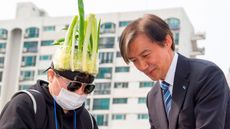 How green onions could swing South Korea's election
How green onions could swing South Korea's electionThe Explainer Country's president has fallen foul of the oldest trick in the campaign book, not knowing the price of groceries
By Sorcha Bradley, The Week UK Published
-
 Ukraine's battle to save Kharkiv from Putin's drones
Ukraine's battle to save Kharkiv from Putin's dronesThe Explainer Country's second-largest city has been under almost daily attacks since February amid claims Russia wants to make it uninhabitable
By Sorcha Bradley, The Week UK Published
-
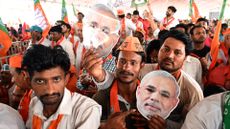 India elections 2024: the logistics of world's biggest vote
India elections 2024: the logistics of world's biggest voteThe Explainer More than 10% of the world's population is registered for a historic democratic exercise, with PM Modi likely to dominate again
By Harriet Marsden, The Week UK Published
-
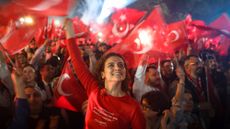 Erdogan set back in key regional elections
Erdogan set back in key regional electionsSpeed Read The main opposition party flipped or held Turkey's biggest cities, including Istanbul
By Peter Weber, The Week US Published
-
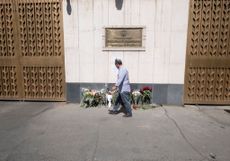 'Islamic State attacks from Afghanistan into Iran and now Russia should be wake-up calls'
'Islamic State attacks from Afghanistan into Iran and now Russia should be wake-up calls'Instant Opinion Opinion, comment and editorials of the day
By Harold Maass, The Week US Published